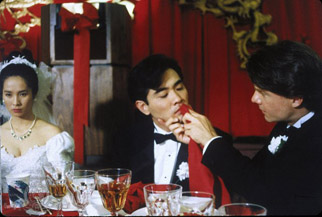Classic Movie Review: The Wedding Banquet
By Edwin Davies
November 26, 2012
Considering the mercurial nature of Ang Lee's career, which has seen him direct everything from costume dramas (Sense & Sensibility) to superhero movies (Hulk) by way of Oscar-winning dramas (Brokeback Mountain) and 3D extravaganzas (Life of Pi), it shouldn't be surprising that The Wedding Banquet, Lee's second film, also refuses to be pigeonholed. Its writer-director has refused to get stuck working in any single genre, so why should the film itself?
The Wedding Banquet starts out as a pretty delicious farce. Wai-Tung Gao (Winston Chao) is a Taiwanese man who has been living in New York for ten years. He's built a life for himself as a successful businessman and landlord, but his very traditional parents keep asking him when he is going to settle down and start a family. Not an ideal situation, but one which is made more complicated by the fact that Wai-Tung is gay, is in a stable, long-term relationship with his boyfriend Simon (Mitchell Lichtenstein, who would later go on to write and direct the vagina dentata horror film Teeth) and is afraid to tell his parents for fear that they will disown him. When his parents sign him up for a singles club, and Wai-Tung has to start going out on dates to avoid embarrassment, it seems that the weight of the lie might be becoming too much to bear. Sooner or later, his parents will find out, or he will have to tell them.
Fortunately, a solution comes in the form of Wei-Wei (May Chin), an artist who rents an apartment from Wai-Tung. Wei-Wei's visa has expired, and without a green card she is in constant danger of being sent back to China. So, in order to keep Wei-Wei in the country and to get Wai-Tung's parents off his back without confrontation, they decide to get married. Problem solved, right? Of course not.
Mr. and Mrs. Gao are overjoyed by the news, and almost immediately hop on a plane so that they can attend the wedding. Not only do the young couple have to go through with the wedding, they have to put on an act for the Gaos. Cue lots of nervous pretending and awkward conversations as the lies start piling up the closer it gets to the day of the wedding.
Despite the potential for La Cage aux Folles-style hijinks inherent in the premise, Lee and his co-writers, Neil Peng and James Schamus, use the set-up as a way of investigating the generational divide between Wai-Tung and his parents, and by extension that between other Taiwanese and Chinese families, rather than just focusing his sexuality. Everything Wai-Tung does to make the whole charade pass as quickly and painlessly as possible - such as getting married at city hall in a small ceremony and avoiding the traditional lavish wedding banquet - is construed as an attempt to be incredibly modern, ignoring traditions that have developed over thousands of years. This in turn creates tension between Wai-Tung and his parents, both of whom think that it is disrespectful for him to have a wedding that does not conform to the old ways. Besides which, since Wai-Tung is their only child, the wedding would be as much a celebration for his parents as it would be for him, and not having any of the usual trappings is a slap in the face as far as they are concerned.
Continued:
1
2




